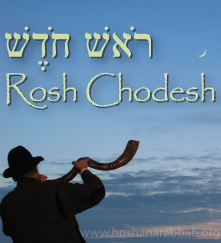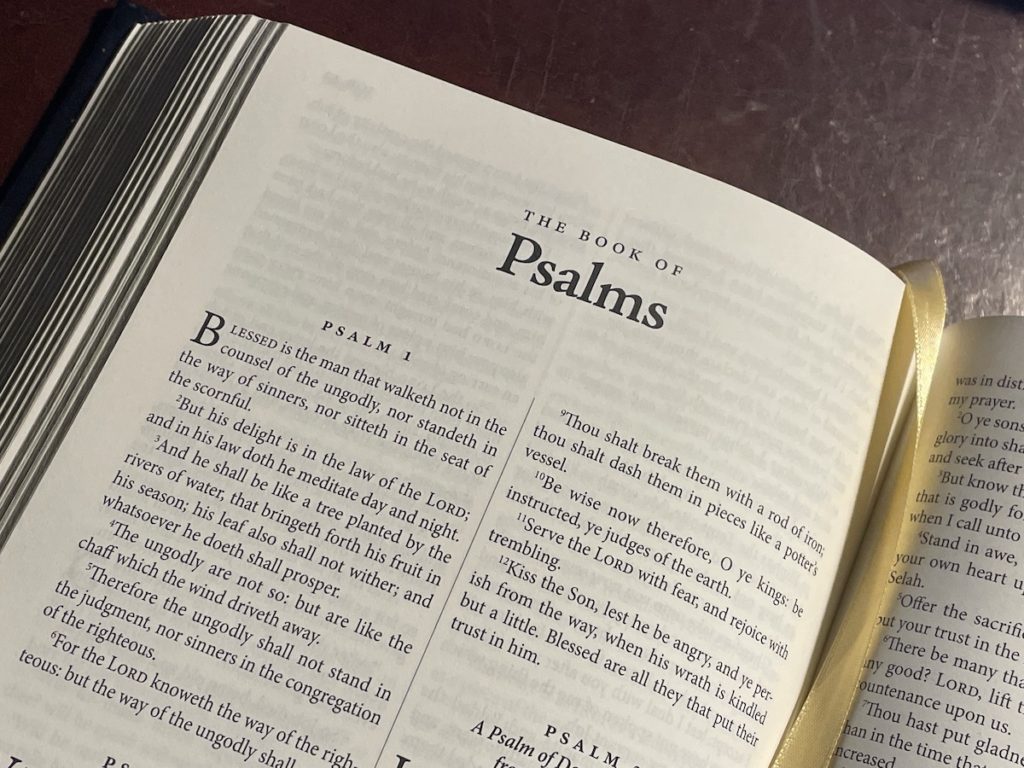
Psalm 81
Psalm 81:3, Blow the trumpet [Heb. shofar] at the time of the New Moon [Heb. chodesh], at the full moon [Heb. keseh meaning full moon or concealed, covered — scholars disagree as to its meaning and the origin of the word], on our solemn feast day [Heb. chag] — NKJV. The ArtScroll Stone Edition Tanach translates this verse alternatively as follows,
Blow the shofar at the moon’s renewal, at the time appointed for our festive day.

The origins of the Hebrew word keseh behind the phrase “full moon” is uncertain and there is debate among the experts on this subject. Some Hebrew lexicons relate it to a Hebrew root word meaning “to conceal, to cover” (e.g., Gesenius; Strong’s number H3677 cp. H3678), while others tell us that it means “fullness; full moon” (e.g., Brown Driver Briggs Hebrew Lexicon; cp. The TWOT; Strong’s). BDB tells us that the origin of keseh is unknown and that it may be an Aramaic loan word meaning “full moon.” Gesenius in his lexicon states that the etymology of keseh isn’t clear, but he favors the idea of the moon being covered or concealed in darkness as opposed to being covered in light (i.e., in its full moon state).
The only other usage of keseh in the Scriptures is found in Prov 7:20, which gives us no clue as to the exact meaning of the word.
Orthodox Jewish scholars tell us that keseh means “to conceal or to cover.” They say that the only biblical festival that occurs at the time of the new moon (biblically, when the first sliver of the new moon becomes visible) is Yom Teruah (or Rosh HaShanah), which occurs on the first day of the seventh month (in late summer). At this time, the moon is nearly completely covered or concealed except for a small, visible sliver.

The next phrase in this verse speaks of a solemn feast day, which is the Hebrew word chag. This word refers to the three pilgrimage festivals, which are Passover and the Feast (or chag) of Unleavened, the Feast (or chag) of Weeks or Pentecost and the Feast (or chag) of Tabernacles (Exod 23:14–16; Deut 16:16).
Jewish scholars relate the word chag to Yom Teruah (which they say refers to Rosh HaShanah, see The ArtScroll Tanach Series Tehillim/Psalms Commentary on this verse). The problem with this interpretation is that the Scriptures never call the day of the new moon (rosh chodesh) a chag, nor is Yom Teruah technically a chag either in the strictest sense of the meaning of the word and its usage in Scripture. Therefore, the word keseh, if it means “concealment” must be referring to both the new moon day (the first day of each month, and to Yom Teruah, which occurs on the first day of the seventh month), while the chag must be referring to the three pilgrimage festivals.
Those scholars who take the word keseh to mean “full moon” say that the phrase in this verse containing this word refers to the pilgrimage festivals (Passover/Feast of Unleavened Bread, Feast of Weeks, and Feast of Tabernacles), which all occurred on or very near the time of the full moon.
Whichever interpretation you side with, the bottom line is this: The Scriptures command us to sound the shofar at the time of the New Moon, on Yom Teruah and during the three pilgrimage feasts. (See also Num 10:10.)
Psalm 82
Psalm 82:1, Elohim stands…the gods/Congregation of the mighty.Dr. Michael Heiser in his two books, Reversing Hermon and The Unseen Realm puts forth a convincing argument that the elohim mentioned in this verse are what Scripture refers to in many places as “the hosts of heaven” and refer to Elohim’s divine heavenly council. This same council is also referred to in Deut 33:2; 1 Kgs 22:19; 2 Chron 18:18; Job 15:8; Jer 23:18; Dan 7:9–10 and Heb 2:1; Acts 7:53.
“The congregation of the mighty” seems to be a reference to Elohim acting as the Supreme Judge among his divine, heavenly council that carries out his orders. This is more than the traditional “Godhead” (i.e., the Father, Son and Holy Spirit) and also includes angelic and spirit beings, and even Satan himself.
From time to time, Elohim gathers his council together as we see in Job (Job 1:6; 2:1). Even lying spirits are subject to and do the bidding of Elohim who presides over this council also referred to as the host of heaven (1 Kgs 22:19–23). Moreover, some of the “Us” passages in the Scriptures, which have typically been attributed to the “Godhead,” according to Heiser, likely refer to this divine counsel (e.g., Gen 11:7; Ezek 44:6). This has been the view of ancient Jewish sages as well.
Modern biblical theologians have traditionally taken a non-supernaturalistic view of Psalm 82:1 by saying that the gods here refer to human rulers. While elohim may by definition and biblical usage refer to human rulers, this passage cannot be limited to this definition alone, since verse seven refers to these gods or elohim as “dying like men” as a result of Elohim’s divine judgment on them because of their wickedness. This threat makes little or no sense if it is referring only to human rulers.
For the record, Yeshua quotes verse six in reference to human rulers (John 10:34; 14:30; 16:11), so this passage should not be taken to refer only to Elohim’s divine counsel or just to human rulers, but probably to both. This is because behind human rulers are evil spirits or principalities that govern the nations (Dan 10:20; Eph 6:12; Rev 13:2) and all of these are under the aegis of Satan, who has his own kingdom (Matt 12:26) and is presently the ruler of this world (John 12:31); however, even Satan’s kingdom is under the ultimate authority of YHVH Elohim.
The idea that there were and are unseen evil spirits and demi-gods that rule the nations of the world behind the scenes is revealed in the book of First Enoch and is also found in traditional ancient Mesopotamian historical accounts and forms the basis for the ancient Greek mythos, as Heiser proves.
Additionally, we learn from Genesis chapter ten (in the Table of the Nations) that, at that time, there were seventy nations of the world that rebelled against YHVH at the Tower of Babel (Gen 11). Interestingly, and a little later, Jacob had 70 descendants who went down to Egypt (Exod 1:5) and who become the children of Israel. From them, Moses chose 70 elders to rule over Israel (Exod 24:1), which would eventually became the Great Sanhedrin that ruled the Jewish people. YHVH then commissioned Israel to evangelize the apostate nations by being a spiritual light to them (Deut 4:5–8)—a task they utterly failed to perform. Picking up where ancient Israel failed in its mission, Yeshua chose 70 disciples not only to replace the Jewish Sanhedrin in spiritual authority over the people of Elohim, but to go forth and to preach the gospel to the 70 nations (Luke 10:1–12, 17; Acts 1:8 cp. Matt 28:18–20) that had been lost to the kingdom of Satan at the Tower of Babel, thereby to reclaim the world for the kingdom of Elohim at the devil’s expense.
Eventually, and hopefully in the not too distant future, the resurrected and glorified saints, who will become the sons of Elohim and will be adopted into his divine family as small E elohim (John 1:12; 1 John 3:1; Gal 3:26; Rom 8:14; Eph 1:5), will rule and reign with Elohim (capital E Elohim, Rev 1:6; 5:10; 20:6) over the new heavens and new earth. This will all be to Satan and his kingdom’s detriment and to that of the small E elohim human rulers of his present-day earthly kingdom, all of whom will be cast into the lake of fire at the end of the age (Rev 20:10).
Psalm 82:6, You are gods…children of the Most High.This statement likely has a dual meaning or double entendré. It can refer to the righteous saints as Yeshua alludes to in John 10:34, or possibly to the demon-nephilim of Genesis 6:4–6 who were the spawn of the heavenly angelic hosts who became the fallen angels and who cohabited with women in the pre-flood world as the context of this psalm seems to suggest.


Numbers 10:10 comes to mind also. Watching for the new moon, crescent sliver, to appear, especially in the 7th month/moon for the fall feasts to begin
Quick observation! President B. will be giving his dark winter speech on Tuesday, the winter solstice! Why not pick a pagan high day and the shortest, darkest day for such a speech!
The Scripture Psalm 81:3 in the Bible or 81:4 in the Tanach has been on my mind for several years. It is hard to understand, especially if the word “כסה” “keseh” today has the meaning of “concealed”, but may have had another meaning in Biblical times. What I do know is that the word, “ירח” “yarakh”, meaning “moon” is nowhere to be found in Psalm 81. The root, Yarakh, is where we get the place name of Jericho. I tend to believe that the word “חדש” “chodesh” means “month”, not moon. I’m tending to lean towards the Tzadoki calendar from the Dead Sea Scrolls whereas there are always 12 months of 30 days each with an extra day at the start of each season, therefore 364 day calendar… never an added 13th month which is not Biblical. That word, “כסה” “keseh” as found in Psalm 81:4(3) is spelled “kaf-samech-hey”. The “keseh” you mentioned in Proverbs 7:20 is another word, “כסא” spelled “kaf-samech-alef” usually meaning “chair or throne”. It seems to me that we should blow the shofar at the beginning of the month and maybe this Scripture is referring to Aviv 1 since it goes on to speak of the Exodus from Egypt and since it also mentions a “חג” “chag” which, as Nathan says, are the three pilgrimage feasts of Matsot, Shavuot, & Sukkot, although Exodus 34:25 mentions Pesach as being a chag. Another oddity is Psalm 81:6(5) where Yosef has a letter “hey” in his name. Yehosef like Avram becoming Avraham or Sarai becoming Sarah.
I address these issues in my article on the new moon at
. However, I do not address the various calendars of the Dead Sea scrolls. The Qumran community toyed around with several calendars over its 150 year or so existence, so they couldn’t even figure out which calendar to use themselves, so I’m disinclined to wade into that morass. You mentioned Avi BM in the part of your comment that I edited out. I don’t have time to listen to a series of podcasts and we have a policy to not post any link that I’m not able to personally check out. With regard to him, I’ve known him since his first visit to Portland in 2000, have a very fond spot in my heart for him and consider him a friend. Have spent much time with him here and in Israel. We’ve even shared our homes with each other. A bright man and I respect his intelligence, but he tends to be here, there and everywhere theologically on many issues. He also has a penchant for digging into the muck/manure of humanistic reasonings and even the esoteric in an attempt to discover a pearl or two. In the time I’ve known him he’s been on three calendars and three wives. Oy vey! Why can’t people just stick with the the Bible? This is one of the problems with the Hebrew Roots Movement.Ever learning and never coming to the truth. Too many people want to get knowledge from too many other sources other than Scripture. Frankly, I don’t have the time for this. I pretty much stick with Scripture, and if I can’t confirm something in it, I don’t bother with it. Blessings.
The first sliver of the New Moon is the dawning of the cycle. And praise YHVH for having HaSatan thrown out of Heaven.
Shalom, John